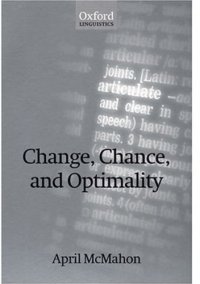
Ebook: Change, Chance, and Optimality
Author: April McMahon
- Series: Oxford Linguistics
- Year: 2000
- Publisher: Oxford University Press
- Language: English
- pdf
This book is about how languages change. It is also a devastating critique of Optimality Theory-the dominant theory in contemporary phonology and increasingly influential throughout linguistics. The author sets out its basis principles and shows it to be incapable of explaining either language change or variation. OT relies on the innateness of certain human language faculties and therefore needs to explain the origins of allegedly genetically-specified features. Professor McMahon considers the nature and evolution of the human language capacity, and reveals a profound mismatch between the predictions of evolutionary biology and the claims for innateness made in OT. She argues further that any convincing theory of linguistic change must take account of the roles of history and chance. - ;This book is about how languages change. It is also a devastating critique of a widespread linguistic orthodoxy. April McMahon argues that to provide a convincing explanation of linguistic change the roles of history and contingency must be accommodated in linguistic theory. She also shows that theoretical work in related disciplines can be used to assess the value of such theories. Optimality Theory, or OT as it is usually called, dominates contemporary phonology, especially in the USA, and is becoming increasingly influential in syntax and language acquisition. Having set out its basis principles, Professor McMahon assesses their explanatory power in analysing language change and its residues in current phonological systems. Using cross-linguistic data, and drawing comparisons with other theories inside and outside linguistics, she shows that OT is incapable of accounting for language change, without the addition of rules and an appreciation of chance and historical contingency that would then undermine its theoretical underpinnings. OT relies on innateness and needs to discuss the origins of allegedly genetically-specified features. The author considers the nature and evolution of the human language capacity, and demonstrates a profound mismatch between the predictions of evolutionary biology and the claims for innateness made in OT. - ;This formidable critique of Optimality Theory (OT) should be required reading for all graduate students in linguistics. Phonologists of every stripe - synchronic and diachronic, regardless of the theories in which they work - ignore it at their peril. Anyone with even a passing interest in linguistic theory would also be well advised to read it, because its implications reach well beyond phonology to involve current hypotheses about the nature and evolution of human language ... this volume should solidfy McMahon's reputation as one of the most insightful linguistic theorists currently writing. - General Linguistics;A critical contribution to the debate on how Optimality Theory accounts (or cannot account) for historical change ... a hard and prolonged look at the claims and practices of OT. - Years Work in English Studies;A stunning book, elegantly argued and deftly written. A major theoretical critique, confronting Optimality Theory and other formalist innatist paradigms with the realities of evolutionary biology and neuroscience. One of the most important and sophisticated works in phonological theory of the past couple of decades. - Roger Lass, University of Cape Town
Download the book Change, Chance, and Optimality for free or read online
Continue reading on any device:

Last viewed books
Related books
{related-news}
Comments (0)